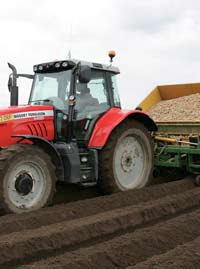Dickeya-infected potato seed may not be replanted in Scotland

Grower members of the SAC’s Association of Potato Producers heard about new risks from diseases and whether to chit seed at their annual conference. Mike Abram reports
Seed crops infected with Dickeya solani, a new more aggressive form of blackleg, could be taken out of seed production in Scotland, Gerry Sadler of SASA told growers at the SAC Association of Potato Producers annual conference.
The proposal to have a zero tolerance to the bacterial pathogen was part of a Scottish government consultation that ended on 29 January, he explained.
“It would mean amendments to the Seed Classification and Plant Health schemes. If the industry is broadly in favour, and initial conversations suggest it is, it would be introduced this summer.”
In that case, seed or ware crops found to be infected with Dickeya in Scotland would not be allowed to be replanted for either seed multiplication or ware. “If it was found you would have to sell your crop for immediate processing or packing. It is quite a draconian measure.”
Where Dickeya was identified and the crops sold off farm, hygiene would be crucial, he added.
Dickeya solani was now responsible for the majority of blackleg cases in the Netherlands causing an estimated €30m in annual losses, he had previously explained.
In Scotland, it had been found in two crops of ware grown from English-grown seed of Dutch origin, and also in variety trial material, while in England around 10 cases had been confirmed in 2009 in seed and ware crops.
“We need to keep it out. As well as the threat to our own production, Scotland is one of the few countries free from it, so it also gives us a competitive advantage,” he said.
Part of the threat is it causes symptoms even at very low levels of inoculum, and is very aggressive causing tubers to rot before harvest in some cases.
A nil tolerance approach is unlikely for England and Wales. “The situation is very different as there is a vast amount of Dutch seed brought in by English growers, which would make it difficult to introduce a nil tolerance, so they are likely to rely on existing blackleg measures.”
UK potato production ‘increases alternaria threat’
